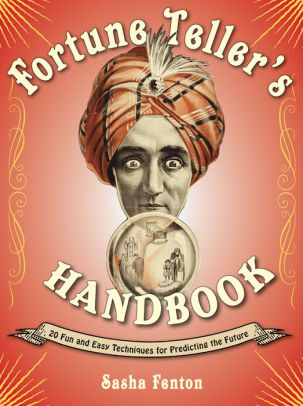This is supposed to be a fun and easy book. Fenton promises that these twenty ways for divining the future are, “all of them easy to use and easy to understand.” She warns in her introduction that what she covers is the tip of the iceberg for these techniques. She covers well known topics like numerology, crystal ball, I Ching, runes, dream interpretation, tarot, pendulums and astrology. She delves into the less known forms of divination like flower reading, dice, dominoes, phrenology, face reading and more.
In her introduction, she states she’s using the pronoun he and him to simplify the text. She does go on to say fortune tellers and their clients are all races, sexual orientation, gender, and so on. This is a cop out and chauvinistic. It is just as easy to use the feminine pronouns or a mixture and by sticking with only the male pronouns, she distances herself from her readers putting off the non-male readers. That said, the tone and writing style are easy to read, conversational, and lightweight. She doesn’t use a lot of complex words or sentence structure which means the book will be easy to read. Reading the text is like talking to a friend, comfortable and easy.
Fenton states she goes too light; any decent web search will bring the reader more information than this book. For example, in numerology she covers the basics but she misses the heart of the divination. This can be said for most of the techniques she’s describing. Some of the divinations are only two pages long.
She writes the book like it is for anyone – religious beliefs not withstanding. However, in several of the essays she talks as though the reader is deeply into Paganism, Wicca, or some other new age belief system. While this is not offending to the readers in those groups, it can be offensive to the other groups who may pick this up. Her marketing is all geared towards – pick up this book for some fun – meaning anyone from any religious background would enjoy it. Yet she writes as though she’s writing for a specific group like Pagans. She needs to pick an audience and write for them.
She states in her introduction she has consulted experts. It seems like if the expert wrote the essay it would have felt more genuine. She does give credit to her experts and is careful to use the language the expert would use. Additionally, she describes anecdotal experiences to illustrate the technique.
Overall, this is a super light version of the divination techniques. While the writing is good quality, the content lacks in a lot of areas. The author is off putting (for me) by only using male pronouns. If the reader is looking for a party favor, this might be it so long as your guests aren’t overly sensitive about Pagan or new age language.
~review by Eileen Troemel
Author: Sasha Fenton
Hampton Roads Publishing 2017
pg. 192

